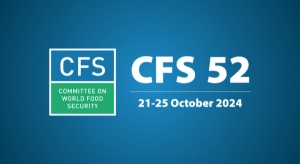
Engagement Hub / Events
The 52nd Plenary Session of the Committee on World Food Security – CFS 52 2024

October 21, 2024 @ 08:00 – October 25, 2024 @ 17:00 CEST
The 52nd Plenary Session of the Committee on World Food Security (CFS52) focused on the 2024 State of Food Security and Nutrition report, the endorsement of those CFS products developed by the Committee during the intersessional period, the update of the CFS Multi-Year Programme of Work for 2024-2027, the report by the High-Level Panel of Experts on Food Security and Nutrition (HLPE-FSN) on “Strengthening urban and peri-urban food systems to achieve food security and nutrition in the context of urbanization and rural transformation”, and other ongoing CFS workstreams and priorities.
The Aquatic Blue Food Coalition at CFS 52
As part of the official programme of CFS 52, the Aquatic Blue Food Coalition co-hosted a side event “Milestones in advancing the right to food through sustainable small-scale fisheries and resilient aquatic food systems.”
2024 marks significant milestones in global efforts to protect the right to food, build resilient aquatic food systems, and support sustainable small-scale fisheries. The side event at CFS 52 commemorated 20 years since the adoption of the Voluntary Guidelines to Support the Progressive Realization of the Right to Food in the Context of National Food Security (RtF Guidelines) and a decade since the CFS’s policy recommendations on Sustainable Fisheries and Aquaculture for Food Security and Nutrition and the endorsement of the Voluntary Guidelines for Securing Sustainable Small-Scale Fisheries in the context of Food Security and Poverty Eradication (SSF Guidelines). Together, these frameworks underscore human rights-based approaches to fostering sustainable aquatic food systems. However, as highlighted in discussions, implementation remains uneven, requiring renewed commitment from States and non-State actors.
Moderator Shakuntala Thilsted (CGIAR) opened the event by emphasizing that the SSF and RtF Guidelines are foundational for inclusive and sustainable food systems. Jón Erlingur Jónasson (Ministry of Foreign Affairs, Iceland; Aquatic Blue Food Coalition) echoed this in his opening remarks, stressing that a people-centered human rights approach is crucial for transforming food systems.
The panel included representatives from the World Forum of Fish Harvesters and Fish Workers, Tanzania’s Ministry of Livestock and Fisheries, the UN Office of the High Commissioner for Human Rights, WorldFish, and the World Bank, offering diverse perspectives on implementing these guidelines. Cairo Laguna (World Forum of Fish Harvesters and Fish Workers) highlighted the critical role of small-scale fisheries in combating hunger and poverty, advocating for their inclusion in COFI’s main agenda to secure resources and support sustainable fisheries. Lilian Ibengwe (Ministry of Livestock and Fisheries, Tanzania) detailed a national plan of action to implement the SSF Guidelines initiated in 2021, focusing on empowering women, improving technology and infrastructure access, promoting small fish consumption for nutrition, and raising awareness of fish’s role in food security.
Therese Arnesen (UN Human Rights), pointed out the tension between profit motives and human rights in global food systems, advocating for treating food as a fundamental right rather than a commodity. Wanjiku Gichohi (WorldFish) shared initiatives from India and Kenya that integrate fish into school feeding programs to address nutritional deficiencies, emphasizing the need for greater involvement of women in the sector. Julien Million (World Bank) explained the Bank’s increasing support of projects within this sector, prioritizing resource management, value-chain approaches to infrastructure, and a long-term vision with realistic targets.
After the panel discussion, Bjørg Sandkjær (Ministry of Foreign Affairs, Norway) underscored small-scale fisheries’ contributions to food systems, nutrition, and livelihoods, especially for women. She emphasized Norway’s commitment to supporting small-scale fisheries as integral to food system transformation, highlighting the need for updated HLPE reports to ensure CFS recommendations reflect current knowledge. Juan Echanove (FAO Right to Food team), echoed this sentiment in his closing remarks, stating that RtF is about dignity and entitlement. He spotlighted issues faced by fishers globally, including restricted access for fishers in Gaza, insecure tenure rights, and the exclusion of Indigenous communities from their traditional grounds. He emphasized that dignity and entitlement must drive efforts to protect and empower fishers and fishing communities now and into the future.
The side event was co-organized by the Aquatic Blue Food Coalition, the Food and Agriculture Organization of the United Nations, Stanford Center for Ocean Solutions, World Bank, WorldFish, Environmental Defense Fund, Ministry for Foreign Affairs of Iceland, Oceana, Government of Norway, Global Action Network Foods from the Oceans and Inland Waters for FSN, UN Decade of Action on Nutrition, and CGIAR.